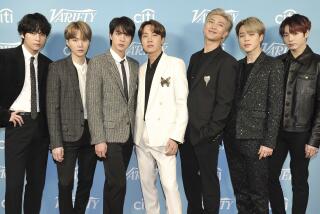Nick Offerman on ‘great scam artist’ Tom Sawyer and his favorite writers

If you imagine Nick Offerman is a real-life version of Ron Swanson, the mustachioed, macho character on “Parks and Recreation,” think again. Sure, he likes the outdoors, and yes, he has a wood shop in Los Angeles. But those things are connected to his life growing up on a farm in Illinois, not so far, really, from the American heartland portrayed by Mark Twain. And Offerman knows Twain; he’s a big reader.
It makes sense, then, that Offerman was recruited to record “The Adventures of Tom Sawyer” for Audible, the audiobook company that is signing up celebrities to voice classic novels; the audiobook, which is available for pre-order, will debut this fall. We caught up with Offerman by phone after his first day behind the mike to talk about the recording process, books and more. Our conversation has been edited for length and clarity.
How well did you remember “Tom Sawyer”?
I’m a good student, so I went and worked on it in preparation – partly because I was nervous about doing character voices, and I wanted to try some stuff out. I had forgotten how terrifying Injun Joe was, but the thing I remembered the most, and probably the greatest source of humor in the book, is Tom’s cleverness in pulling scams on the other boys in town. Whether he’s whitewashing the fence or getting them to trade him their tickets in Sunday school so that he can earn a Bible with the collected tickets. He’s such a great scam artist. I love that about him. He’s a true American hero.
Can you tell me about recording the audiobook?
I recorded my own two books, and it’s much more difficult than I would have imagined. When they said, ‘Do you think you can do an eight-hour day,’ I was, like, ‘Yeah, sure, I’m an old hoofer from the old school, that’s what I do is perform.’ But I had never sat in front of a microphone and talked constantly for even an hour. And so it was an education immediately on how taxing it was on the voice and creating the whole world and characters and performances, all from the whole cloth of my own imagination. This is my first time doing a piece of fiction or a piece of writing that’s not my own.
Even when I’m reading my own writing that’s obviously much clumsier than that of Mark Twain, you immediately snap into that mode where you’re trying to imbue all of the writing with enthusiasm and charisma so that the listener, they’ll follow the writer’s intention through your successful performance.
At the National Book Critics Circle prizes in March, you presented the lifetime achievement award to the writer Wendell Berry, and you’ve co-produced a documentary about him. How did you come to know his writing?
In about 1995 I was doing a production of Sam Shepherd’s play “Buried Child” at the Steppenwolf Theater in Chicago; specifically I was hired to understudy Ethan Hawke. And I was also working as a makeup artist on the show, putting old age makeup on the venerated late American actor named James Gammon. Another actor in the show, guy by the name of Leo Burmester, handed me a book of Wendell Berry short stories and said, ‘I think you’re going to get a kick out of these.’ And, boy, it kind of turned my whole life upside-down. I was really moved by Wendell Berry’s creation, in his body of fiction, of a community that reminded me of the great farming family that I grew up in in Illinois. And then, just devouring all of his writing, then his essays and his poetry further cemented him as, in my opinion, the living writer with the most common sense and the most hard-hitting pathos for the human race. He’s my John Lennon or my Gandhi. I think if everybody would read Wendell Berry we’d have a lot less people shooting at each other.
Wendell Berry... He’s my John Lennon or my Gandhi.
— Nick Offerman
Do you see any continuity between the world of Tom Sawyer and the kind of community that Wendell Berry has evoked?
Absolutely. Another writer that I really enjoy is Garrison Keillor, in the same vein of humorism, and think when Wendell is funny, and when he’s nostalgic, he’s right up there with those guys. They’re all telling stories often built upon the morality, the values of these small American communities, which is often a source of annoyance to the protagonist in the story. Whether it’s a hectoring Aunt Polly trying to keep Tom Sawyer out of trouble or it’s members of the church in Lake Woebegon in Garrison Keillor’s writing, it’s a wonderful, I think, description of the way communities are like families and the way neighbors are so much like siblings. You don’t always get along with each other, but at the end of the day, we all understand that we have to take care of one another.
There are story points in Tom Sawyer that also bring to mind “To Kill a Mockingbird,” where kids are ultimately misbehaving. They’re going out of bounds, they’re breaking the rules, but at the end of the story it turns out that they’re good kids and they’re still allowed to remain in the fold. And through their misadventures they’ve uncovered some sort of bad guy or antagonist, and there’s a sunny ending thanks to the heroism of these mischievous children. That always spoke to me as a kid; I always took that lesson to heart: that you should break the rules a little bit and explore the boundaries of what you can get away with, because you might end up saving the day. [Laughs]
Did you ever end up saving the day, or getting in trouble?
I certainly got in trouble. I don’t remember pulling off anything particularly heroic, à la Tom Sawyer or Scout Finch. But I did, I do think that I impressed my elders with an intrepid love of exploration and adventure. As long as I turned in good grades, they said OK, you’re pushing the boundaries of what’s going to keep you out of jail, but we’re going to allow it as long as you keep appearing to be a contributing member of society.
Mark Twain was part statesman, part drunk uncle and part bard.
— Nick Offerman
Where do you see “Tom Sawyer” or Mark Twain in our national history of books?
Well, I’m a big fan of Mark Twain. I’d be hard-pressed to name anybody since him who was such a clear satirist. He spun a very simple yarn that was rife with delicious satire, making fun of all of us. Somebody who I’m a big fan of, modern day, is George Saunders, and I feel like, more than anybody I can think of, George is a modern-day Mark Twain who pokes fun at us all, but very gently. I feel like Mark Twain was part statesman, part drunk uncle and part bard. So he’d make fun of us and make us laugh but while putting his arms around us; we’d be grimacing and shying away because his cigar would be so stinky, but ultimately we’d be glad for the stories he told.
You’ve written about your love of the outdoors. How do you connect to that in urban Los Angeles?
Los Angeles actually has a great deal of nature available. My favorite thing to do in Los Angeles is hike. … Griffith Park is actually an incredibly vast, mountainous park in which I hike regularly. And then all around L.A. County, there’s a few mountain ranges. There are hikes that are actually quite astonishing, just day hikes, five minutes into it, you say, holy cow, I can’t believe L.A. is five minutes away but suddenly I feel like I’m in the Rocky Mountains. But I love the Midwest. Every July I go fishing with my family in Minnesota – being in the woods of the Midwest is where I feel the most profound connection to what I consider my own personal Walden. I do a lot of canoeing, and we’re out in the woods, just fishing and living very simply. That’s where I charge my batteries, under the trees and the open sky, and sitting out on a lake catching fish. I take that with me then, for the many days I’m sitting in traffic in Los Angeles.
When you go to Minnesota, will you be bringing books with you, or do you unplug from reading, even?
What I unplug from is all the channels: the phone, the Internet, the email. That’s what keeps you from reading. So you leave all that crap at home and take your books to the woods. I mean, that’s one of the most important things about vacation, is just curling up with a book. And my wife [actress Megan Mullally] is the same way; she’s such a voracious reader, it’s scary.
I just finished my own third book, which is coming out in October [“Good Clean Fun: Misadventures in Sawdust at the Offerman Woodshop” from Dutton] and it was really fun to write and create, but I’m so excited to be done, because now I can read again. George Saunders has a novel coming out next year, “Lincoln in the Bardo,” and he sent me an early copy, and it’s astonishing. It’s astonishing; it’s so funny and poignant, it had me laughing and crying with great regularity. And I just devoured the last book by Matthew Crawford (who wrote “Shop Class is Soulcraft”), a new book called “The World Beyond Your Head,” which blew my mind, it’s so good. It’s packed with exactly the philosophy I was kind of just talking about. It breaks down how the human race has come to where we are, where our freedom exists today, and how can we keep our hands on that freedom by avoiding the consumerist channels that try to claim our attention. I was really moved by that. And now I’m reading a great book called “American Canopy,” which is a history of our country through its forests.
Kellogg is the LA Times’ book editor
ALSO:
Neil Gaiman on making art, mistakes and his ‘View from the Cheap Seats’
The Great American Novel is ‘Sula,’ by Toni Morrison says Critic at Large Rebecca Carroll
The Great American Novel is Harper Lee’s ‘To Kill a Mockingbird,’ says Critic at Large John Scalzi
More to Read
Sign up for our Book Club newsletter
Get the latest news, events and more from the Los Angeles Times Book Club, and help us get L.A. reading and talking.
You may occasionally receive promotional content from the Los Angeles Times.







